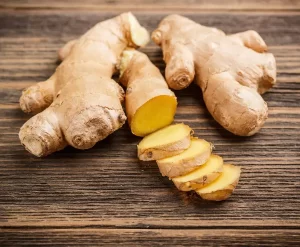
Ginger, scientifically known as Zingiber officinale, is one of the world’s most ancient and widely cherished spices. Its origins trace back over 5,000 years to the tropical forests of Southeast Asia, specifically in regions like India and China. The plant belongs to the Zingiberaceae family, which also includes turmeric and cardamom, other staple spices of traditional cuisines and remedies.
Historically, ginger was first cultivated for its culinary and medicinal properties. In ancient India and China, it was revered not only as a spice but also as a sacred herb. Ayurvedic texts from India and traditional Chinese medicine documents highlight ginger’s role in treating various ailments, from digestive issues to inflammation.
Ginger’s popularity quickly expanded through trade routes. During the Roman Empire, it was imported from the East and became a prized commodity in Mediterranean kitchens. Romans used ginger not only in cooking but also as a key ingredient in their health regimens. With the fall of the Roman Empire, ginger’s prominence in Europe temporarily diminished but was revived during the Middle Ages. By then, it had become a luxury spice, often used in desserts, drinks, and even as a form of currency.
In the 15th century, explorers like Marco Polo documented ginger cultivation in their travels, and European colonial expansion brought the plant to new continents. By the 16th century, ginger was being cultivated in the Caribbean, Africa, and the Americas.
Today, ginger remains a global staple, appreciated for its versatility in culinary traditions and its enduring role in traditional and modern medicine. The humble root, once exclusive to its Southeast Asian homeland, now thrives worldwide, symbolizing the interconnectedness of cultures and the enduring human quest for health and flavor.
Ginger, renowned for its pungent flavor and aromatic zest, is not just a culinary delight but also a powerful natural remedy. Packed with bioactive compounds like gingerol, this ancient root offers an impressive array of health benefits, making it a staple in traditional medicine and modern wellness practices.
Gingerol, the primary active compound in ginger, is known for its potent anti-inflammatory and antioxidant effects. Regular consumption of ginger may help combat oxidative stress, a leading cause of chronic diseases like heart disease, cancer, and diabetes.
Ginger has long been used to alleviate digestive discomfort. It aids in speeding up gastric emptying, reducing bloating, and relieving nausea. It’s particularly effective in combating morning sickness during pregnancy, as well as motion sickness and post-surgery nausea.
Studies suggest that ginger can reduce muscle pain and soreness, particularly after exercise. Its anti-inflammatory properties also make it effective for managing chronic pain conditions like osteoarthritis.
Ginger’s antimicrobial and anti-inflammatory qualities help boost the immune system, protecting against common illnesses like colds and the flu. Warm ginger tea is a popular remedy for soothing sore throats and relieving congestion.
Emerging research indicates that ginger may play a role in managing blood sugar levels, making it beneficial for individuals with diabetes or those looking to maintain stable energy levels throughout the day.
By improving blood circulation and reducing cholesterol levels, ginger supports overall heart health. Its anti-inflammatory effects may also help prevent blood clots, reducing the risk of stroke.
Ginger has been associated with improving brain function and reducing age-related cognitive decline. Its antioxidants and bioactive compounds can help protect the brain from inflammation and oxidative stress, both linked to neurodegenerative diseases like Alzheimer’s.
Ginger may assist in weight management by boosting metabolism and promoting feelings of fullness. It also helps regulate digestion, which can be key to maintaining a healthy weight.
From ancient traditions to modern scientific validation, ginger continues to prove its worth as a natural powerhouse for health and wellness. Whether enjoyed as a fresh root, dried spice, or concentrated supplement, its benefits are as versatile as its uses, making it a valuable addition to any lifestyle.

While ginger is celebrated for its numerous health benefits, it is important to recognize that even natural remedies require mindful consumption. Like any powerful ingredient, ginger can have potential side effects and interactions that warrant caution, especially for certain individuals and in specific situations.
Though rare, some people may experience allergic reactions to ginger. Symptoms can include skin rashes, itching, or swelling. If you suspect an allergy, discontinue use immediately and consult a healthcare professional.
In some cases, consuming excessive amounts of ginger can lead to mild gastrointestinal issues, such as heartburn, diarrhea, or stomach irritation. People with sensitive stomachs should start with small amounts and observe their body’s response.
Ginger has natural blood-thinning properties, which can be beneficial for improving circulation but risky for individuals taking anticoagulant medications like warfarin. Combining ginger with these medications may increase the risk of bleeding. Always consult a healthcare provider if you are on blood-thinning drugs.
In addition to blood thinners, ginger may interact with medications for diabetes and high blood pressure. It has the potential to lower blood sugar and blood pressure, which can lead to dangerously low levels when combined with medication.
While ginger is often used to alleviate morning sickness, excessive consumption during pregnancy may pose risks. Some studies suggest that high doses of ginger could increase the risk of miscarriage, although evidence is inconclusive. Pregnant individuals should limit intake to small, moderate amounts and seek medical advice.
Ginger stimulates bile production, which can be beneficial for digestion but problematic for individuals with gallstones. Excessive bile stimulation may worsen the condition, so those with gallbladder issues should avoid high doses of ginger.
Like any supplement or herb, moderation is key. Consuming more than 4 grams of ginger per day is generally not recommended, as it may lead to adverse effects. Ginger supplements, in particular, should be taken as directed and under the guidance of a healthcare professional.
Not all ginger products are created equal. Contaminants or additives in processed ginger products, such as teas, powders, or capsules, may reduce their effectiveness or cause harm. Always choose high-quality, organic ginger products from reputable sources.
Ginger is a natural ally for health, but its potency requires mindful use, especially for those with pre-existing conditions or on medication. By understanding its potential risks and consulting a healthcare provider when necessary, you can safely enjoy ginger’s many benefits while minimizing any unwanted side effects.
Ginger’s versatility makes it a staple in kitchens, wellness routines, and traditional remedies worldwide. Whether you’re looking to spice up your meals, soothe a cold, or boost your health, there are countless ways to use ginger effectively. Here’s a guide to incorporating this powerful root into your daily life.
Fresh ginger root adds a zesty and aromatic flavor to dishes. It can be:
Tip: Always peel fresh ginger before using it to remove the tough outer skin.
One of the simplest ways to enjoy ginger is in tea form:
Ginger powder, made from dried and ground ginger root, is a convenient option for:
For those seeking concentrated benefits, ginger supplements are available in capsule or tablet form. These are especially useful for managing nausea, inflammation, or pain. Always follow the dosage instructions and consult a healthcare provider before starting supplements.
Ginger essential oil is commonly used in aromatherapy and topical applications:
Often served with sushi, pickled ginger (gari) is a tangy and refreshing palate cleanser. You can also add it to salads or sandwiches for a burst of flavor.
Candied ginger is a sweet treat with a spicy kick. It’s great for snacking, baking, or combating motion sickness during travel.
Extracted ginger juice can:
Ground ginger or fresh ginger paste can be used in homemade skin and hair care remedies. For example:
In Ayurveda and traditional Chinese medicine, ginger is used in herbal concoctions to:
With so many ways to use ginger, it’s easy to integrate this versatile root into your lifestyle. Whether consumed fresh, dried, or as an extract, ginger offers endless possibilities to enhance your meals and support your health.

Ginger is a widely accessible ingredient found in various forms to suit culinary, medicinal, and wellness needs. Whether you’re looking for fresh ginger, powdered spice, or supplements, here’s a guide on where and how to find it.
Most supermarkets stock fresh ginger root in the produce section. Look for firm, smooth-skinned roots without wrinkles or soft spots. Many stores also carry:
Farmers’ markets often offer fresh, organic ginger, sometimes including unique varieties. Purchasing from local growers ensures high quality and supports sustainable practices.
Asian markets are excellent sources for ginger in various forms, including:
For those seeking ginger supplements or organic options, health food stores are a go-to destination. They typically stock:
E-commerce platforms offer a vast selection of ginger products, making it easy to find specific types, such as:
Tip: When buying online, ensure you’re purchasing from reputable sellers with positive reviews.
For the freshest ginger, consider growing your own! Ginger is relatively easy to cultivate in warm climates or indoors in pots. Local farms or nurseries often sell ginger plants or rhizomes for home gardening.
Pharmacies often stock ginger in supplement form, marketed for nausea relief, digestion, and inflammation. Check the vitamins and herbal remedies section for:
For niche ginger products, such as artisanal ginger-infused drinks, desserts, or skincare, specialty online stores provide curated selections. These often include:
With its growing popularity, ginger is easy to find in most places, whether you prefer shopping locally or online. By exploring different sources, you can choose the form and quality that best suits your needs, ensuring you enjoy the full benefits of this versatile root.

Ginger root is renowned for its numerous health benefits, ranging from digestive support to reducing inflammation. It’s particularly effective in alleviating nausea, whether caused by motion sickness, pregnancy, or chemotherapy. Ginger also has anti-inflammatory and antioxidant properties, which may help relieve pain, support the immune system, and promote cardiovascular health. Additionally, its warming, spicy flavor makes it a versatile ingredient in culinary dishes and herbal teas, enhancing both taste and wellness.
Ginger ale can help with nausea, but its effectiveness depends on the type of ginger ale. Traditional ginger ale made with real ginger may offer mild relief due to ginger’s natural anti-nausea properties. However, many commercial ginger ales contain little to no actual ginger and are primarily flavored with artificial ingredients, which might not provide the same benefits. For more effective nausea relief, opt for ginger teas or natural remedies with real ginger content.
Ginger benefits the body in numerous ways, primarily due to its anti-inflammatory and antioxidant properties. It aids digestion, alleviates nausea, and reduces bloating by promoting healthy gastrointestinal function. Ginger can also help relieve pain, such as muscle soreness or arthritis, and improve circulation by thinning the blood. Additionally, it boosts the immune system, supports heart health by reducing cholesterol levels, and may even help regulate blood sugar, making it a versatile natural remedy for overall wellness.
Copyright All rights reserveds